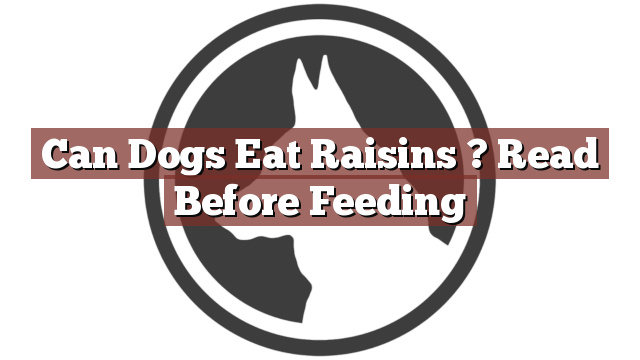Understanding Your Dog’s Dietary Needs
As a responsible dog owner, it is essential to understand your furry friend’s dietary needs. Dogs require a balanced diet that includes protein, carbohydrates, fats, vitamins, and minerals. While there are certain human foods that can be safely shared with dogs, it is crucial to be aware of which foods are potentially harmful to their health. One common question that arises is, "Can dogs eat raisins?" Before you decide to give your dog any new food, it is important to gather all the necessary information to make an informed decision.
Can Dogs Eat Raisins? Read Before Feeding
No, dogs should not eat raisins. While raisins may seem harmless, they can actually be toxic to dogs. Raisins, along with grapes, can cause severe kidney damage and even lead to kidney failure in dogs. It is still unclear why grapes and raisins are toxic to dogs, as the exact substance responsible for their toxicity has not been identified. However, it is essential to note that even a small amount of raisins can have detrimental effects on a dog’s health.
If you have ever wondered, "Can my dog eat raisins?" it is crucial to err on the side of caution and refrain from feeding raisins or any grape products to your furry companion. The toxicity of raisins can vary from dog to dog, and some may not show any symptoms after consuming them. However, others may experience symptoms such as vomiting, diarrhea, lethargy, loss of appetite, abdominal pain, or decreased urine production. In severe cases, dogs may also develop acute kidney failure, which can be life-threatening.
Pros and Cons of Feeding Raisins to Dogs
The cons of feeding raisins to dogs heavily outweigh any potential pros. While raisins are a good source of dietary fiber, antioxidants, and certain vitamins, these benefits do not outweigh the risks associated with raisin consumption in dogs. The potential kidney damage that can occur as a result of eating raisins far outweighs any potential health benefits. Therefore, it is best to avoid giving raisins to dogs altogether.
Conclusion: Proceed with Caution and Consult a Veterinarian
In conclusion, it is crucial to remember that dogs should not eat raisins. The potential for kidney damage and failure far outweighs any potential benefits. If you suspect that your dog may have consumed raisins or is showing any symptoms of raisin toxicity, it is vital to seek immediate veterinary care. Prompt treatment can help in minimizing the damage caused by raisin ingestion. To ensure the health and well-being of your furry companion, always consult a veterinarian before introducing any new foods into their diet.
Thank you for taking the time to read through our exploration of [page_title]. As every dog lover knows, our furry friends have unique dietary needs and responses, often varying from one canine to another. This is why it's paramount to approach any changes in their diet with caution and knowledge.
Before introducing any new treats or making alterations to your dog's diet based on our insights, it's crucial to consult with a veterinarian about [page_title]. Their expertise ensures that the choices you make are well-suited to your particular pet's health and well-being.
Even seemingly harmless foods can sometimes lead to allergic reactions or digestive issues, which is why monitoring your dog after introducing any new food item is essential.
The content provided here on [page_title] is crafted with care, thorough research, and a genuine love for dogs. Nevertheless, it serves as a general guideline and should not be considered a substitute for professional veterinary advice.
Always prioritize the expert insights of your veterinarian, and remember that the health and happiness of your furry companion come first.
May your journey with your pet continue to be filled with joy, love, and safe culinary adventures. Happy reading, and even happier snacking for your canine friend!

